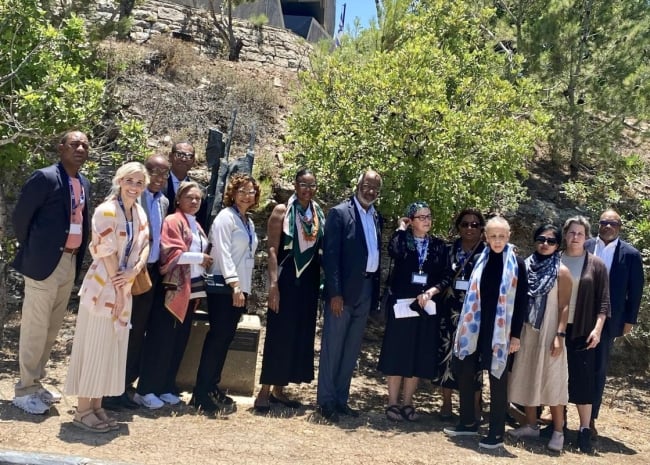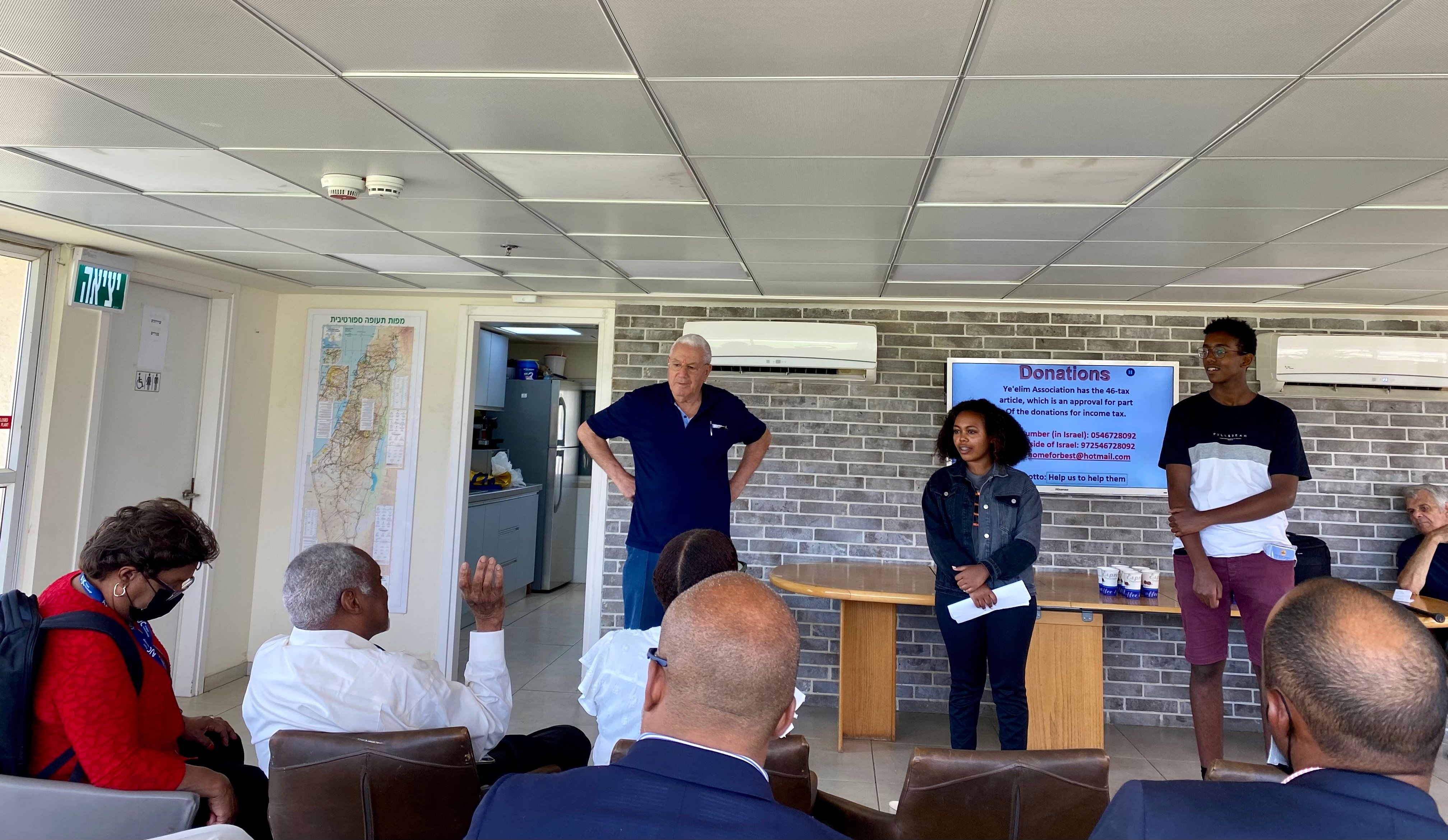You have /5 articles left.
Sign up for a free account or log in.

HBCU presidents visit Yad Vashem Holocaust Memorial and Museum on an inaugural trip to Israel.
TMCF
Six presidents of historically Black colleges and universities visited Tel Aviv earlier this month for an inaugural HBCU leaders’ delegation to Israel.
The nine-day trip was the outgrowth of a partnership made this spring between the Thurgood Marshall College Fund, an organization representing public HBCUs, and the American Jewish Committee, a Jewish advocacy organization. The committee runs a program called Project Interchange that brings international thought leaders to Israel so they can learn about Israeli society and build relationships with counterparts there.
Amy Goldstein, assistant vice president of organizational advancement at TMCF, described the trip as a “capacity-building” mission to experience a country known for its technological innovation and “to find out what the opportunities were for our schools to partner with Israeli institutions for student exchanges, faculty exchanges and joint research opportunities.”
Nisha R. Abkarian, director of Project Interchange at AJC, said while they design trips to meet the unique needs of each group, the main objective is the same.
“Our goal is to develop a really customized introductory program to Israel that gives participants the opportunity to experience firsthand Israel’s diversity, its democracy, its complexities, its accomplishments and some of its challenges, so they can see what this innovation nation is all about and also develop professional relationships that will be useful for them once they return,” she said.
The HBCU presidents who participated are the heads of land-grant institutions — Florida A&M University, Tuskegee University, Virginia State University, Langston University, Alabama A&M University and Fort Valley State University — historically Black universities established in 1890 that focus on food sciences and agriculture research. A goal of the new partnership is to bring the presidents of all 19 historically Black land-grant institutions on future trips.
“We just felt like it was a natural exchange because of some of the great technology in Israel, agriculture technology, so we wanted to start with that connection,” said Harry Williams, president and CEO of TMCF.
Nichole Johnson, director of program development at the Institute of International Education, said in an email that Israel is known for its many tech start-ups and “globally recognized centers of academic and research excellence,” which makes it an attractive place for universities to pursue international partnerships.
Some observers felt that the trip also had political implications.
“This may be an inaugural trip of HBCU presidents, but it’s not an inaugural relationship in terms of HBCUs and the current … support for improving Israel’s image in the world,” said Robin D. G. Kelley, Gary B. Nash Endowed Professor in U.S. History at the University of California, Los Angeles.
He noted that Black intellectuals have had strong ties to Israel since the founding of the state.
“With the formation of Israel in 1948, there was a lot of Black support for Zionism, and that has to do with a lot of things,” said Kelley, who is also a board member of Palestine Legal, a project to provide legal advice and support to students and other activists in Palestinian solidarity groups. “It has to do with the fact that Zionism was perceived to be a kind of anticolonial, nationalist movement against the British, not just against colonialism but for some kind of postcolonial order, some new freedom. Israel is considered [as] having biblical significance.”
The idea of an “unbreakable bond” between Israel and “Black clerical institutions, educational institutions, that’s an old, old idea,” he said.
However, he noted that Black civil rights activists ideologically “split” over the Israeli-Palestinian conflict at various points in history, including the 1967 war, when Israel captured the Gaza Strip and other Palestinian territories, and the Gaza War in 2009. More recently, the juxtaposition of protests in Ferguson, Mo., over the killing of Michael Brown and simultaneous clashes in Gaza in 2014 created a sense of solidarity with Palestinians among some activists, he said.
He believes as more students of color see the Israeli-Palestinian conflict as a racial justice issue and respond to outreach from Palestinian activists, Israel advocacy organizations are especially eager to renew connections with students of color and the institutions that serve them.
“It’s about changing the narrative,” he said.
Abkarian said Project Interchange trips are intended to be “strictly apolitical” in message.
“Our delegation programs are not designed to advance a particular political agenda or perspective on complicated issues like [the] peace process but rather to expose participants to leading Israeli voices, also to familiarize them with competing narratives,” she said. “Not because we’re aiming for so-called balance, but because we think that any substantive and nuanced introduction to Israel has to encompass all of those different elements if it’s going to be successful.”
The Israeli-Palestinian conflict is a hotly debated issue on many American campuses, and some scholars have advocated for a boycott of partnerships with Israeli higher education institutions as a form of protest. But Williams said there hasn’t been any noticeable controversy among HBCU students or faculty members surrounding the trip.
“The reality of it is, it’s summertime,” he said. “No one is on campus. Summertime, a lot of our activists take a break from college campus activity.”
He also noted that HBCU students show particular interest in programs related to the culture and politics of countries in Africa and the Caribbean, where many of their international student colleagues are from, and HBCU student activists are especially focused on fighting racism and discrimination at home in the U.S., so Israeli politics may be less of a focus for them.
“You don’t see a lot of activity on HBCU campuses in particular on Israel,” he said. “We just haven’t had that. That was one of the appeals about the trip, because we wanted to introduce new interests for students to engage and participate in.”
Among other stops, the trip included meetings with academics at Hebrew University, Ono Academic College, Tel Aviv University, the Technion–Israel Institute of Technology, the Israel Space Agency and the Volcani Center, a research hub focused on agricultural research and innovation run by Israel’s Ministry of Agriculture. The presidents also visited Google’s office in Tel Aviv and met with representatives of the BIRD and BARD Foundations, which promote U.S.-Israeli cooperation in water science, energy, agriculture, cybersecurity and other fields.
Larry Robinson, president of Florida A&M University and the only member of the group who had been to Israel before, said the group tried "to take advantage of every minute we had in the country”
He noted that Florida A&M has been working with Haifa University in Israel to create a student exchange program since 2019 that he’s eager to launch once COVID-19 rates decline. He also hopes to pursue research collaborations with Israeli institutions in fields such as food safety, agriculture and environmental science.
Williams said TMCF staff members left with “pages and pages” of notes on potential opportunities, including ideas for joint research projects between HBCU and Israeli faculty and student exchange programs. Meanwhile, the first “concrete” outcome was that HBCU presidents have already invited Israeli students to their universities.

Multiple presidents offered full scholarships to two recent high school graduates in Israel’s Ethiopian minority community who spoke with them about Ye’elim, an association that provides airplane pilot training to Ethiopian Jewish teenagers. TMCF plans to follow up with the students after they complete their compulsory service in the Israeli military to connect them to HBCUs where they could continue their aviation education.
Julie Baer, research specialist at the Institute of International Education, said in an email that fewer than 1 percent of international students at HBCUs were from Israel during the 2020–21 academic year. Similarly, HBCU students studying abroad in Israel remains fairly uncommon. There was an “upward trend” in HBCU students going abroad in general in the last five years before the pandemic, a peak of 2,425 HBCU students in the 2018–19 academic year that fell to 700 in 2019–20, but Israel hosted fewer than 1 percent of students studying abroad from HBCUs.
Williams is eager to change that.
”The majority of our institutions have in their mission an international component for students to be able to experience different cultures outside of the American culture,” he said. A goal of the trip was “creating this opportunity for our presidents to see how they can connect their students, connect their faculty to an area of the world that is significant in a way that could be meaningful and expanding the educational opportunities for the students and for the community.”
The delegation also visited religiously and culturally significant sites such as the Western Wall, the Church of the Holy Sepulchre, the Temple Mount, Yad Vashem Holocaust Memorial and Museum, the Sea of Galilee, and Abu Ghosh, an Arab-Israeli town.
As part of fostering a better understanding of Israel’s political, religious and ethnic diversity and the Israeli-Palestinian conflict, Project Interchange also organized meetings for the presidents with Khalil Shikaki, a professor of political science and director of the Palestinian Center for Policy and Survey Research; Yossi Shain, a member of the Knesset, Israel’s Legislature; and leaders at the Portland Trust, an organization focused on socioeconomic mobility for Israelis and Palestinians, among others, Abkarian said.
Organizations focused on creating American ties with Israel have partnered with HBCUs in the past. Notably, a group of HBCU students traveled to Israel in December 2019 on a trip organized by Maccabee Task Force, an Israel-advocacy organization supported by the late conservative philanthropist Sheldon Adelson, the Times of Israel reported. The organization held a Black Student Summit in Atlanta to engage students at HBCUs and predominantly Black institutions a year later. HBCU students have also been invited to attend policy conferences run by the American Israel Public Affairs Committee, a bipartisan political lobbying group that advocates for pro-Israel policies.
Robinson said he’s received only positive feedback about the trip and believes discussions surrounding Israel are less heated on HBCU campuses because these institutions “have had such a rich history of opening our doors to anyone who chose to come, regardless of their political, religious or ethnic background,” which can encourage “civil discourse.”
He sees building academic relationships in Israel as of “mutual benefit.”
“We want [students] to take advantage of innovative … learning and research experiences around the globe, and clearly Israel presents those opportunities,” he said.
Abkarian said that Israeli universities also have a lot to learn from HBCUs about how to best serve and expand higher education to some of the country’s religious and ethnic minorities.
“Israel is a young society and a young nation,” she said. “As Israel is engaging in nation-building and looks to bring the benefit of higher education to the full range of groups in its society—to increase the participation in the workforce of Haredi [ultra-Orthodox Jewish] women, for example, or Arab-Israeli women—maybe there are lessons that can be learned from HBCUs, which have been working to and have been very successful at bringing educational opportunity to Americans from all walks of life for over 100 years.”





